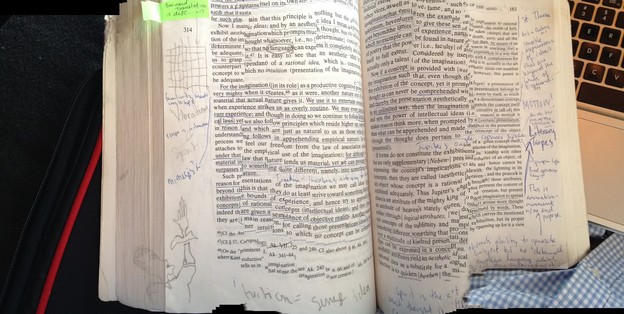Feel beauty supply, post 3
What is an aesthetic idea?

So if you were to flip through my personal copy of The Critique of Judgment and land on § 49 “On the Powers of the Mind Which Constitute Genius,” the most important pages to me as an undergraduate and graduate student, you would see that some classmate rudely crossed out the words “A poet” and replaced it with “Maggie” so that the sentence in my edition reads: “[Maggie] ventures to give sensible expression to rational ideas of invisible beings, the realm of the blessed, the realm of hell, eternity, creation, and so on.” (183) What does this mean?
Well, a “rational” idea in Kant is one that only exists in the mind. That is, “hell” and “eternity” are abstract concepts. You can’t take me to hell or show me eternity in the material world. Such ideas exist only in the faculty of Reason according to Kant’s cognitive paradigm. They are therefore “rational.” But a poet’s job according to Kant is to find “sensible expression” — as in perceptible to the senses — to communicate such ideas. By creating “sensible expressions,” i.e. poems, the poet prompts the mind of the reader to present such rational ideas to herself, though the language is inadequate to them because “no example [of the concept] can be found in nature” (184) and language is just a form in nature, the material world.
Implied in Kant is that a poet knows that language as sensuous form is always inadequate to the purely ideational. The poet also knows, however, that the mind of the reader, if instigated correctly by poetic language will produce in herself “so much thought as can never be comprehended within a determinate concept.” (183) The poem prompts the reader into her own powers of thinking, so much thinking that she can never adequately present all of it in language or any other limited, determined, sensual form. The poem in this way prompts the reader’s mind into what Kant calls “play.” He calls this process play because the signifier is never quite adequate to the signified, therefore the utilitarian or “purposeful” cognitive process of conceptualizing is never complete. The reader instead is doing something like endless musing. The only “purpose” for such thought according to Kant is to witness the powers of our own minds, therefore it is not the determined labor of navigating ourselves through the world. [This is one rare point of confluence between Kant and Hurston. Art as play. Play as in opposition to labor. Though Hurston’s power structure isn’t top down, like Kant’s, as we’ll see this later in the series.]
In any case, I think this part of Kant is right in many ways. What’s exciting about some works of art is precisely the way they allow your mind to fall into a rabbit hole of correspondences — emphasis on “respond.” That’s often where I find pleasure in reading. I’m thinking here of something like the ending of Hawthorne’s “Young Goodman Brown.” There is no way to determine whether Goodman Brown’s experience was or wasn’t a dream and one therefore continually returns to the facts of the story, the language, looking for the possibility of a definite ending. But the story forces the reader to again and again concede that there is not definite ending. The text leaves both possibilities equally in play.
The problem in Kant, I think, is the Genius part. The poet is a Genius, if he knows what forms will prompt such thought in the reader. The poem in this paradigm is analogous to nature in Kant’s description of sublime judgment. The Genius poet, then, is the divine creator writ small, an installation artist who reveals the true meaning of our own existence to us.
Yet, what about the reader? Kant wants the cognitive abilities revealed in the reader to be a marker of the reader’s universal humanity, what he calls elsewhere “vocation.” This ability to feel the powers of our mind is the basis of a species identification. When I feel my mind “playing” in this way, I know that I am human and that I share all these faculties with other humans, yet this shared human nature can only be revealed to me through the imposition of a ‘natural’ hierarchy with the Genius artist on top.
In this way Kant’s privileging of the artist points to the problem of modern western thought. In the theoretical attempts to create a basis for a universal humanity, some humans most be humans with distinction.
Once again I see that I have exceeded my word limit and have not taken you to the Pyramids as I promised in my last post. The Pyramids, next time, I promise.
FEEL BEAUTY SUPPLY